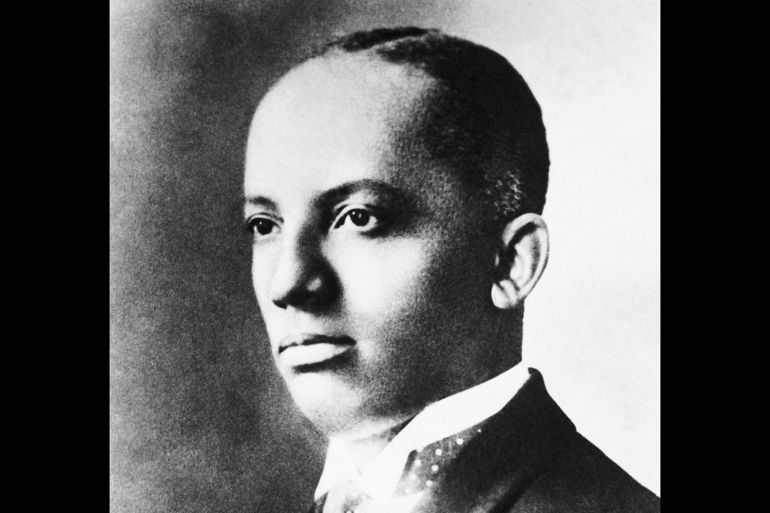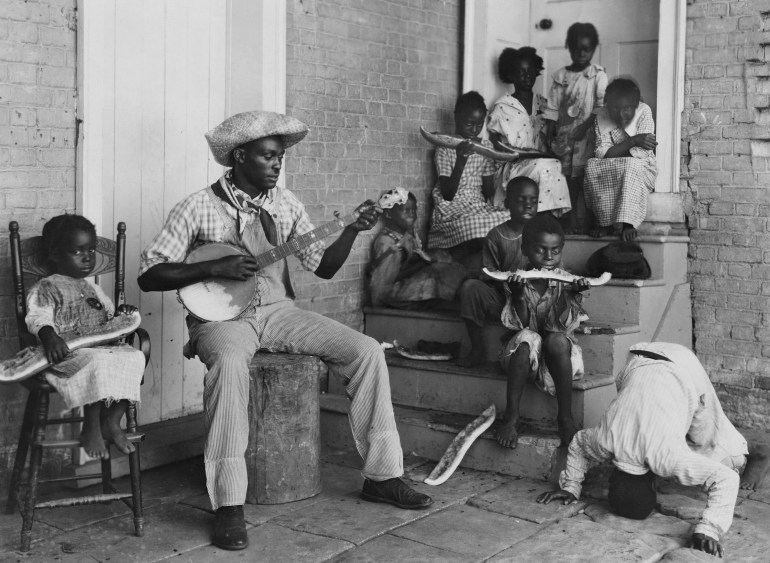What is Black History Month and why does it matter?
Black History Month is an annual celebration of African-American history and contributions in the formation of the modern US.

February is celebrated as Black History Month (BHM), which highlights African-American history and the contributions of Black people in the United States.
It has been almost 100 years since Carter G Woodson, known as “the father of Black history”, started Negro History Week in 1926, which set the stage for what is now known as Black History Month. The annual event is now observed across several countries.
Keep reading
list of 4 itemsWhy we still need Black History Month in the US
Why Black History Month makes me feel like a failure
A global happy birthday to hip hop
What is Black History Month?
In the US, BHM is normally celebrated around a theme with activities at universities, schools, museums and the like. This year’s theme is the contribution of African Americans to art.
These contributions are vast, from stoneware jars made by enslaved people to the Harlem Renaissance in the 1920s, from the Black Arts Movement in the 1960s to the creation of music, including jazz, rock and hip-hop.
African-American contributions to the arts date back hundreds of years during the times of American slavery with the creation of the banjo, which descended from West African instruments. Slavery was abolished in the US in 1865, but deep-seated anti-Black sentiment continued pushing Black culture and history to the margins of American society.

The recognition of Black history is not just limited to the US. Canada also observes Black History Month in February, and the United Kingdom and Ireland celebrate Black History Month in October.
How did Black History Month originate?
Woodson, the Black author, chose February because Frederick Douglas, an American abolitionist who escaped from slavery at the age of 20, and Abraham Lincoln, the 16th president of the US, were both born in February. Lincoln is crediting with banning slavery at the end of the Civil War.
Moreover, at the time when Woodson advanced the idea in the early 20th century, the legacy of both figures had broad appeal and cultural relevance in the US.
The shift from a week to a month began in two places around the same time. In Chicago, Frederic H Hammurabi Robb, a student activist founded the House of Knowledge cultural centre and used that institution to build a community around advancing the idea of moving Negro History Week to Negro History Month. Due to Woodson’s influence in his home state of West Virginia, African Americans there started to celebrate February as Negro History Month. In addition, Kent State University Black United Students (BUS) were one of the first organizations to advocate for Black History Month.
The momentum from the civil rights movement of the 1950s and 1960s, which campaigned against racial segregation and disenfranchisement of Black people, would play a critical role in raising awareness of Black history in universities and civil rights organisations.
In 1976, President Gerald Ford would make Black History Month official on the day the US celebrated its 200th birthday.
Ford would close his bicentennial speech with the following: “I urge my fellow citizens to join me in tribute to Black History Month and the message of courage and perseverance it brings to all of us.”
Black History goes digital
With the popularity of TikTok and Reels on Instagram, Black digital creators have leveraged social media to present bit-sized nuggets of Black history. For example, Maynard Okereke, known as the Hip Hop MD and creator of the Hip-Hop Science Show, occasionally uses hip-hop themes to relate scientific facts.
Sally McMullin uses her popular series Black Stories We Should All Know on TikTok to tell stories from the history of Black culture. She even has an episode on Woodson:
@drhelena_md #Repost VC: @Sallymcmullin On Instagram I really appreciate that you shared this video, which touches on mostly untold historical facts. I really recommend checking out her Instagram account, as she frequently posts about Black history. 😊 #blacktiktok #blackhistorymonth #blackhistory #fyp
Dara Tucker, songwriter and social commentator, covers everything from film and television to Black history. In this reel, she discusses in her series The Breakdown a period in 1919 known as the “Red Summer”, in which white supremacist violence and racial riots spanned more than three dozen cities throughout the US.
The Public Broadcasting Service uses a short-form documentary format in PBS Voices to cover areas where pop culture and Black history meet.
Is Black history American history?
Yes, and some take umbrage with the idea of Black history being separate from general American history. There is an attempt to resolve this issue and that is the inclusion of critical race theory (CRT) and its concepts in schools and universities.
CRT is an attempt at understanding how systemic racism shaped public policy in the US. CRT emerged in the late 1970s and early 1980s with the work of legal scholars Derrick Bell, Kimberle Crenshaw and Richard Delgado.
Recently, there has been a political backlash against CRT in many US states. Some argue that CRT is too divisive and distorts American history across just racial lines. While pro-CRT advocates see the value of building awareness around highlighting institutional shortfalls due to systemic racism.
In April, the Critical Race Studies Program at the University of California at Los Angeles released a report, Tracking the Attacks on Critical Race Theory, which found that 49 of the 50 US states have introduced some form of anti-CRT measures.
Black history is not limited to just the effects of systemic racism, but some argue that clarifying the historical record on how injustice has impacted the Black experience provides clarity on the wider American historical experience.